Don't wanna be here? Send us removal request.
Text
Outdoor Activities for Kids
In today’s digital age, encouraging children to engage in outdoor activities is more important than ever. At Apples and Bananas Preschool, we believe that outdoor play is not just about fun - it’s a vital part of a child’s development. For children aged 3 to 5 years, outdoor activities offer a wealth of benefits, from physical health to cognitive growth.
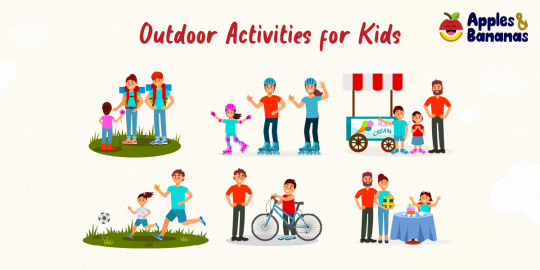
Benefits of Outdoor Activities for Kids
Engaging in outdoor play provides numerous advantages for young learners:
Physical Development: Activities like running, jumping, and climbing enhance motor skills and overall health.
Cognitive Growth: Exploring nature stimulates curiosity and problem-solving abilities.
Social Skills: Playing with peers outdoors fosters communication, cooperation, and empathy.
Emotional Well-being: Outdoor play reduces stress and promotes happiness.
Outdoor Activities List for 3 to 5-Year-Olds
Here’s a curated list of engaging outdoor activities suitable for preschoolers:
1. Play with Colours
Rangoli with Flower Petals: Let them create simple patterns using marigold or rose petals.
Water Rangoli with Chalk or Colors on wet cement floors during the monsoon.
2. Free Play in Open Spaces
Running and Chasing Games (simple tag or “Pakdam Pakdai”)
Ball Play: Rolling, kicking, or throwing soft balls.
3. Mini Traditional Games
Stapoo (Hopscotch): Simplified version using chalk and short jumps.
Kite Flying: Small kites with parental guidance during festivals like Makar Sankranti.
Inspired to get your little one moving? Try out these outdoor activities and bring learning to life - right in your backyard or local park. Full blog here applesandbananaspreschool.com
0 notes
Text
Opposite Words for Kids in English
When your child learns a new word, they opens the door to a whole new world. But when they learn both the word and its opposite, they begin to understand context, comparison, and deeper meaning-a huge step in early education.
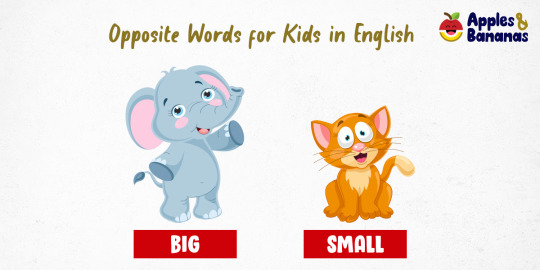
At Apples and Bananas Preschool, we believe that the best learning happens when kids are having fun. And what could be more fun than learning simple opposite words through play, pictures, and everyday experiences?
What are Opposite Words?
Opposite words (also called antonyms) are word pairs that express completely different meanings. For example:
Hot ↔ Cold
Happy ↔ Sad
Up ↔ Down
These are the first building blocks of logic, reasoning, and creative thinking for young minds.
Benefits of Learning Opposite Words for Kids
1. Boosts Vocabulary
Children begin to understand more than just new words—they learn how to use them in real life.
2. Improves Speaking & Understanding
Knowing opposites helps kids describe their feelings, actions, and surroundings better.
3. Sharpens Observation Skills
Children start noticing the differences between objects, actions, and emotions.
4. Makes Reading & Writing Easier
Kids who know opposite words grasp stories, instructions, and rhymes more easily.
Ready to build your child’s vocabulary the fun way? Start exploring opposites today and watch their confidence grow. Dive in now: applesandbananaspreschool.com
0 notes
Text
Jump, run, play, and grow. Explore exciting outdoor activities for 3 to 5 year olds that every parent should know.
0 notes
Text
Want to make learning English simple and exciting for your child? Our latest blog on opposite words has just what you need.
0 notes
Text
Why Social Development is Important in Early Childhood
In the early years of a child’s life, learning goes far beyond letters and numbers. One of the most critical aspects of early childhood education is social development – the ability to build relationships, express emotions, and understand others. Apples and Bananas Preschool place great importance on nurturing these skills through interactive and play-based learning experiences in our Playgroup, Kindergarten, and Day Care Centre programs.
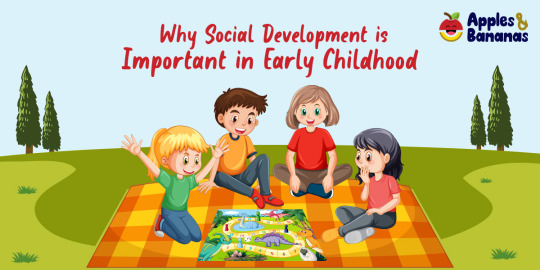
What is social development in early childhood?
Social development in early childhood refers to how young children learn to interact with others, manage emotions, build friendships, and adapt to group environments. It includes the development of empathy, cooperation, turn-taking, communication, and problem-solving. These skills shape how a child forms relationships and handles social situations throughout life, beginning as early as age two and continuing into adolescence.
Why is Social Development So Crucial in the Early Years?
During the first five years, children are highly receptive to learning how the world works, especially through their interactions with peers and adults. Social development forms the foundation for:
Positive peer relationships
Emotional well-being
Conflict resolution
Language and communication skills
Self-regulation and empathy
Without strong social foundations, children may struggle with collaboration, classroom behavior, and even academic success later in life.
Discover how building social skills early can shape your child’s future - read the full article for insights and expert guidance: applesandbananaspreschool.com
0 notes
Text
Finger Painting Activities for Preschoolers
Finger painting is more than just a colorful mess. For preschoolers, it’s an essential hands-on activity that stimulates creativity, boosts motor skills, and fosters early cognitive development. At Apples and Bananas Preschool in Ahmedabad, we believe in learning through play – and finger painting is the perfect blend of exploration, expression, and education.
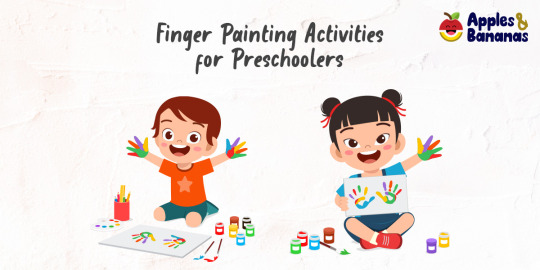
What is Finger Painting and Why is it Important in Preschool?
Finger painting is an art activity where children use their hands and fingers to apply paint to paper or other surfaces. Unlike traditional tools like brushes, finger painting provides tactile stimulation and promotes fine motor coordination.
Why is finger painting beneficial for preschoolers?
Finger painting encourages children to express emotions, practice color recognition, develop hand-eye coordination, and strengthen sensory awareness. It also lays the foundation for writing by refining finger muscle control and movement. Most importantly, it builds confidence in their creative abilities without the fear of making mistakes.
Unlock the full potential of play-based learning — read the complete blog to see how finger painting fosters creativity and early development: applesandbananaspreschool.com
0 notes
Text
Messy hands, happy minds. Discover how finger painting turns fun into learning magic at Apples and Bananas Preschool. Ready to see the colors fly?
0 notes
Text
It’s more than ABCs and 123s. Discover why social development is the heart of early childhood growth - and how we nurture it every day at Apples & Bananas Preschool.
0 notes
Text
Exciting Summer Activities for Kids
Summer is the perfect time for kids to explore, learn, and have fun. Engaging children in meaningful activities not only keeps them entertained but also enhances their creativity, motor skills, and social interactions. Whether indoors or outdoors, there are countless ways to make summer a season of adventure and learning.

Apples and Bananas Preschool, known as the top Preschool in Ahmedabad, we encourages children to participate in exciting and educational summer activities that help them grow while having fun. In this blog, we will explore the best summer activities for kids to keep them active, happy, and engaged.
Why are Summer Activities Important for Kids?
During summer vacations, children tend to spend more time in front of screens and less time engaging in productive activities. Structured and well-planned summer activities offer multiple benefits:
Enhance Creativity: Art, music, and storytelling activities boost imagination and cognitive abilities.
Encourage Physical Fitness: Outdoor play and sports improve strength, coordination, and overall health.
Promote Social Skills: Group activities teach teamwork, patience, and communication.
Prevent Summer Learning Loss: Educational games and skill-building tasks keep young minds sharp.
Develop Independence: Engaging in self-directed play fosters problem-solving and decision-making skills.
Read the full blog here: Summer Activities for Kids
0 notes
Text
Healthy Eating Habits for Kids
Developing healthy eating habits in children from an early age is crucial for their overall growth, cognitive development, and long-term well-being. Proper nutrition not only fuels their energy levels but also strengthens their immune system, supports brain function, and reduces the risk of lifestyle diseases in the future. As parents, educators, and caregivers, it is our responsibility to introduce and encourage balanced eating habits in young children.
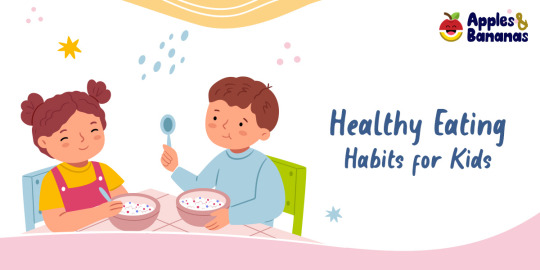
Apples and Bananas Preschool is a renowned and child-friendly Preschool in Ahmedabad, loved by kids. We prioritize teaching children about healthy food choices in a fun and interactive way. This blog will provide a comprehensive guide on healthy eating habits for kids, the benefits of a balanced diet, and practical tips for parents to implement at home.
Why Are Healthy Eating Habits Important for Kids?
Instilling nutritious eating habits from an early age lays the foundation for a lifetime of good health. A well-balanced diet helps:
Support Physical Growth: Nutrient-dense foods like fruits, vegetables, proteins, and dairy provide essential vitamins and minerals that help in the development of bones, muscles, and tissues.
Boost Immunity: A diet rich in vitamin C, zinc, and antioxidants helps fight infections and strengthens the immune system.
Improve Brain Function: Omega-3 fatty acids, found in foods like fish, flaxseeds, and walnuts, enhance memory and cognitive abilities.
Maintain a Healthy Weight: A well-balanced diet helps prevent obesity and reduces the risk of lifestyle diseases such as diabetes and heart problems.
Encourage Positive Eating Behavior: Teaching kids to enjoy a variety of healthy foods reduces picky eating and promotes a lifelong appreciation for nutritious meals.
Read the full blog here: Healthy Eating Habits for Kids
1 note
·
View note
Text
Summer is the perfect time for kids to explore, learn, and have fun. Engaging children in meaningful activities not only keeps them entertained but also enhances their creativity, motor skills, and social interactions. In this blog, we will explore the best summer activities for kids to keep them active, happy, and engaged.
0 notes
Text
Developing healthy eating habits in children from an early age is crucial for their overall growth, cognitive development, and long-term well-being. This blog will provide a comprehensive guide on healthy eating habits for kids, the benefits of a balanced diet, and practical tips for parents to implement at home.
0 notes
Text
Gross Motor Skills Activities for Preschoolers
Gross motor skills play a crucial role in a child’s overall development. These skills involve large muscle movements that help with activities like walking, running, jumping, and climbing. Strengthening gross motor skills in preschoolers enhances their coordination, balance, and strength, laying a strong foundation for future physical activities and daily tasks. Let’s explore the best gross motor skills activities for preschoolers that make learning fun and engaging.
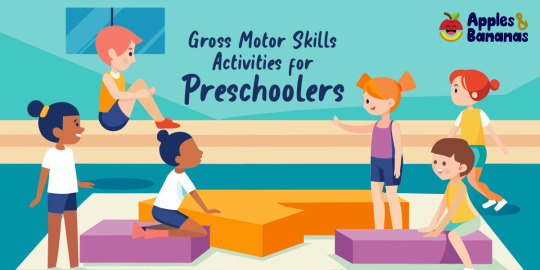
Why Are Gross Motor Skills Important?
Gross motor skills help children develop physical strength, coordination, and confidence. They are essential for performing everyday activities such as:
Running and playing outdoors
Climbing stairs
Jumping and balancing
Throwing and catching objects
Riding a bicycle or a scooter
Encouraging gross motor activities for toddlers and preschoolers can also improve their social skills, as many of these activities involve group play and interaction.
Best Gross Motor Skills Activities for Preschoolers
1. Obstacle Course Fun
Create a simple indoor or outdoor obstacle course using pillows, cones, or hula hoops. Have children crawl under tables, jump over cushions, and walk along a taped line. This helps improve coordination, balance, and problem-solving skills.
2. Jumping Games
Jumping is an excellent way to develop leg strength and coordination. Activities like:
Hopscotch
Jumping over small objects
Trampoline jumping
These activities promote balance and agility while making exercise enjoyable.
Boost your child's coordination and strength with these fun gross motor skills activities for preschoolers. Read more here: applesandbananaspreschool.com
#Gross Motor Skills#Preschoolers#gross motor activities#Obstacle Course Fun#Jumping Games#Hopscotch#Animal Walks
0 notes
Text
Educational Activities for 5 Year Olds
At the age of five, children are at a crucial developmental stage where they are curious, eager to learn, and full of energy. Engaging them in educational activities not only fosters cognitive, social, and motor skills but also makes learning an enjoyable experience. Whether at home or in a classroom, incorporating fun and interactive activities for 5-year-olds can build a strong foundation for their academic and social growth.
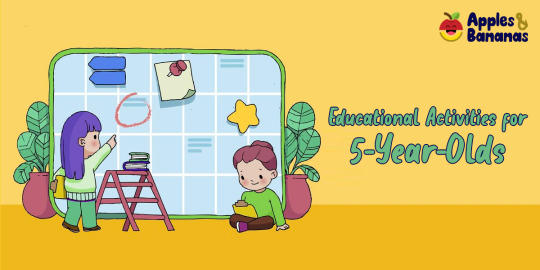
Why Are Educational Activities Important for 5 Year Olds?
Educational activities for kids help in developing essential skills such as problem-solving, communication, creativity, and critical thinking. These activities also enhance fine motor skills, hand-eye coordination, and social interaction. By making learning fun and engaging, children are more likely to retain information and develop a love for education.
Best Educational Activities for 5 Year Olds
1. Alphabet and Phonics Games
Objective: Enhance letter recognition and phonemic awareness.
Use flashcards with letters and corresponding images to teach sounds.
Play “I Spy” with letter sounds (e.g., “I spy something that starts with B”).
Encourage children to trace letters using sand, shaving cream, or chalk.
2. Number and Counting Activities
Objective: Develop early math skills.
Count objects like toys, fruits, or buttons to reinforce number sense.
Use play dough to shape numbers and practice simple addition and subtraction.
Play board games that involve rolling dice and counting spaces.
Make learning fun with these engaging and educational activities for 5-year-olds. Read more here: applesandbananaspreschool.com
0 notes
Text
Gross motor skills play a crucial role in a child’s overall development. These skills involve large muscle movements that help with activities like walking, running, jumping, and climbing.
0 notes
Text
At the age of five, children are at a crucial developmental stage where they are curious, eager to learn, and full of energy. Engaging them in educational activities not only fosters cognitive, social, and motor skills but also makes learning an enjoyable experience.
0 notes
Text
Age Criteria for Nursery Admission 2025-26
Selecting the right preschool for your child is a crucial step in laying the foundation for their future. Understanding the age criteria for nursery admission ensures your child enrolls at the right developmental stage, maximizing their learning potential. At Apples and Bananas Preschool, we prioritize creating an environment tailored to every child’s age and abilities.
Let’s explore a detailed guide on the age criteria for nursery admission 2025-26, ensuring a seamless admission process for parents.
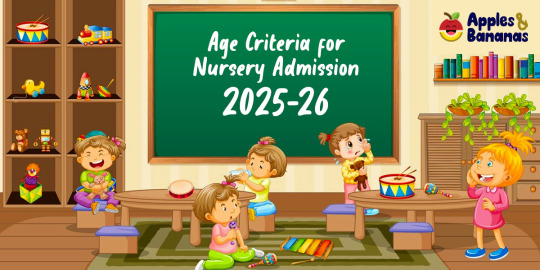
Why Age Criteria Matters for Nursery Admission
The age criteria for nursery admission are designed to match children’s developmental milestones with the learning experiences offered in preschool. Admitting a child too early or too late can impact their ability to adjust, learn, and interact with peers effectively.
Standard Age Criteria for Nursery Admission in India
For most preschools in India, including Apples and Bananas Preschool, the standard age range for nursery admission is between 2.5 to 4 years. Here’s how it typically works:
Lower Age Limit: Children must be at least 2 years and 6 months old by June 1, 2025.
Upper Age Limit: Children should not exceed 4 years of age by June 1, 2025.
This range ensures children are developmentally prepared for the activities, interactions, and structured learning that the nursery offers.
Wondering if your little one is the right age for nursery admission? Get the latest age criteria for 2025-26 here. Click here to learn more: applesandbananaspreschool.com
0 notes